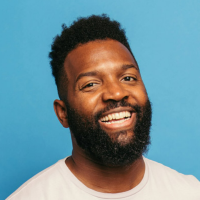How to Deconstruct Racism, One Headline at a Time
Generations before us have long fought for freedom, equality and justice, and those yet to be born will one day pick up the same fight. “We are the handoff,” said author, activist and comedian Baratunde Thurston. “It’s a relay.”
 Thurston, who delivered Monday’s opening keynote for the 2021 ASAE Annual Meeting, talked about how we can each approach this moment in history in a message that was filled with insight, honesty, humor and empathy. Thurston is an Emmy-nominated host who has worked for The Onion, produced for The Daily Show, advised the Obama White House, and wrote the New York Times bestseller How To Be Black. He also hosts two podcasts: How To Citizen with Baratunde and We’re Having A Moment.
Thurston, who delivered Monday’s opening keynote for the 2021 ASAE Annual Meeting, talked about how we can each approach this moment in history in a message that was filled with insight, honesty, humor and empathy. Thurston is an Emmy-nominated host who has worked for The Onion, produced for The Daily Show, advised the Obama White House, and wrote the New York Times bestseller How To Be Black. He also hosts two podcasts: How To Citizen with Baratunde and We’re Having A Moment.
He deftly remarked that, while the novel coronavirus rolled out like it had a strategic marketing plan for how it would bring us all together to face a disease that doesn’t discriminate, the truth quickly became clear: COVID-19 didn’t pick winners or losers, but our established systems did.
Certain people and communities were hit harder than others through both health impacts and economic loss. The shared sacrifice of 2020 wasn’t shared equally at all. (The first sign of the coming Armageddon: Thurston’s Whole Foods in Los Angeles where he lives ran out of kale.)
And then, in the midst of masking, social distancing, stocking up on hand sanitizer and wiping down groceries, news broke of Breonna Taylor’s death and the killing of George Floyd. “Safer at home” no longer rang true.
Thurston said he, as with all of us, felt so much in 2020: exhaustion, despair, rage, hope and joy. Those conflicting feelings are what caused him to start How to Citizen. The podcast became his way to breathe new life into our democracy – something he felt was dying with no one ready or willing to resuscitate it.
He also created a framework that we can all use to get somewhere better together. Each of the steps help create a change in mindset and encourage small investments on the local level. Thurston said we all live somewhere despite the rhetoric of being global citizens. Our blocks, our neighborhoods and our cities are where we care most about and where we feel most invested.
Here are the four pillars of Thurston’s framework:
- Show up and participate: Engage in citizen as a verb. Thurston said it was impressive to see people shift from sourdough starters to reading how to be an antiracist books in the pandemic – even if the change was short-lived. Celebrate people trying, stumbling, learning and facing failure. Showing up can be humbling. We all want to get to justice quickly and easily, but that’s not how it works. The destination is an inspiration, not a place we get to and claim victory.
- Invest in relationships with ourselves and others. We have to know ourselves – the good and the ugly – and at the same time know we’re not complete. We can all look at our past, reflect on it, acknowledge our feelings and learn. Healing requires us to acknowledge harm. Like each of us as individuals, our country also has a beautiful and hideous story. We cannot pick and choose the best parts of our story and miss the opportunities we have to grow. “Accept the pain and the praise for what we’ve done,” Thurston said. History is a constant attempt to prove ourselves, but avoiding what we’re ashamed of doesn’t help us grow.
- Understand the power we have. Don’t point fingers without recognizing what we have to change in ourselves first. Vote, of course, but also be intentional about where we choose to put our attention and money. Use what we have for good … like Superman.
- Use all of this for the benefit of the many. Our collective interests are just that – collective. Thurston said he believes we have barely scratched the surface of what we can be as a country. We started our nation in a hole that we kept digging. We’re all less than we could be because we’ve taken from so many throughout our history – Native Americans, Black people, immigrants, women and other groups who we’ve held back. If we finally invest in everyone, we have an opportunity to be richer and greater than we ever thought we could be.

